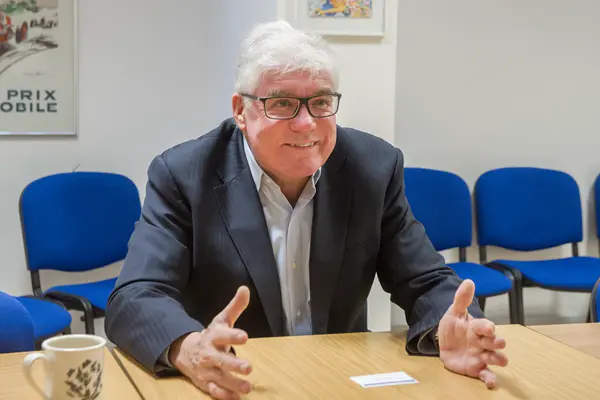Australia's Foreign Minister Julie Bishop has outlined a new paradigm in Australia's international relations, championing economic diplomacy -- a business-oriented soft power push -- that she says will drive poverty elimination and overcome geo-political challenges.
Speaking in Sydney on Monday morning to launch Australia's refreshed economic diplomacy agenda at the Lowy Institute, Bishop said, "Foreign policy is economic policy, economic policy is foreign policy."
She added, "The Coalition government has enhanced that truism by promoting 'economic diplomacy' as a core concept of our international engagement."
The foreign minister said, "The goal of economic diplomacy is peace (and the) real driver of poverty elimination will always be economic growth."
Bishop's speech represents a turning point in Australia's diplomatic strategy, and serves to simultaneously deflect criticism of the Abbott government's deep and broad cuts to regional foreign aid.
Foreign aid out, economic partnership in
Australia's fiscal sacrifice, which was outlined in May's controversial 2014 federal budget, is the headline reduction in foreign aid spending.
World Vision Australia chief executive Tim Costello led a chorus of damnation for the cuts that he claimed made up about one fifth of overall budget savings.
Costello said the Abbott government was balancing the books on the backs of the poor.
"Of the 36 billion Australian dollars (32 billion U.S. dollars) budget savings, aid cuts contribute 20 percent when aid is only 1. 3 per cent of total budget," he said.
Bishop has dismissed this criticism, saying foreign aid plays a role in education or disaster management, "but foreign aid alone is not the panacea to poverty."
"The real driver is and will always be economic growth," the foreign minister said.
A new Australian soft power
The new Australian soft power -- a power derived by the government's unleashing of the various sectors enmeshed in international business -- will be built upon the open eddies of global business.
Bishop has already been vigorously plotting a way forward, with the 96 Australian head- of-mission in overseas posts delivering a 2000-page document outlining regionally specific economic diplomacy strategies.
Her soft power ploy is certain to draw cheers from the private sector, engaging, as it does, to substantially realign the work the government does overseas, "and to give the private sector and NGOs new and innovative ideas about the opportunities ahead."
China is the example
Bishop was quick to draw parallels with Australia's key economic partner China.
The foreign minister has reiterated on several occasions China' s application of economic growth as the single core ingredient to that nation's historic elevation of hundreds of millions of citizens out of poverty.
"China is now a donor nation," she noted, rather than a recipient of foreign aid.
But the new principle, while maintaining economic drivers as its engine, aims to draw in players that can contribute to more than just mutually beneficial, cross-border commerce.
Building a "win-win" national image
She described the new paradigm as the deployment of Australia's untapped economic assets.
"Assets not exclusive to government and naturally including business and private sectors, community, SME's, think tanks, NGO's ... artists, athletes and actors."
With Hollywood's clarion call churning out a host of Australian A-list celebrities and the national sporting obsession serving Australia's global image as a country of Ian Thorpe's and surfing legends, Bishop is drafting a strategy straight out of the soft power playbook, while anchoring engagement with China's economic " win-win" philosophies.
"Economic diplomacy is an overarching principle that puts strong economic outcomes at the centre of our foreign, trade, investment, tourism and development assistance policies." Bishop said.
Despite criticism of Australia having too many gatekeepers to market access, particularly in the FIRB which is seen as staring down potential investors in agricultural resources, the foreign minister said Australia wanted to be an "open, export-oriented free market economy."
"Our country is a great place to invest and do business," she said.
Defense ties
And to play at war.
"Our strong economic relationships allow us to broaden the relationship to encompass defence cooperation," she said, pointing to both Japan and China.
China's People's Liberation Army (PLA) will for the first time conduct joint military exercises in Australia.
According to a joint statement released three weeks ago in the wake of a four-day visit to Australia by General Fan Changlong, vice chairman of China's Central Military Commission, China, Australia and the United States will take part in a land exercise called "Exercise Kowari" in Northern Australia in October.
China FTA still top of agenda
Certainly, deepening economic relationship between China and Australia and the expectant elevation of that relationship should be top of the Department of Foreign Affairs and Trade's (DFAT) agenda.
China has notably urged the acceleration of FTA negotiations and Bishop was keen to use Australia's leverage as host of this year's G20 meeting in Brisbane as a catalyst.
The foreign minister told an audience of media, academics and economic leaders that she was "hopeful" that there will be a "high quality free trade agreement in place" in November.
 简体中文
简体中文

